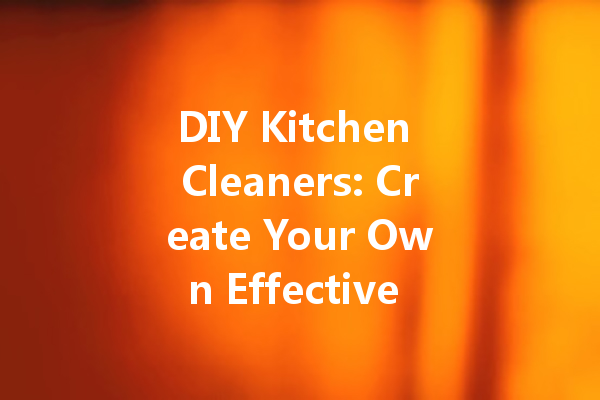Cleaning your kitchen doesn’t have to mean exposing yourself to harsh chemicals. With a few simple ingredients you likely already have at home, you can create your own effective homemade kitchen cleaners. This article will explore several recipes for DIY kitchen cleaners, discuss their benefits, and share tips on how to use them safely.
The Benefits of Homemade Kitchen Cleaners
Using homemade kitchen cleaners offers both environmental and health benefits. Many commercial cleaning products contain toxic substances that can be harmful if inhaled or ingested. By making your own cleaners, you can control the ingredients, making them safer for your family and pets. Additionally, homemade cleaners are often more cost-effective and reduce plastic waste associated with packaged products.
Essential Ingredients for Homemade Cleaners
To start your journey into DIY cleaning, gather a few key ingredients:
These ingredients can be combined in various ways to create cleaning solutions tailored to different cleaning tasks throughout your kitchen.
All-Purpose Kitchen Cleaner Recipe
For a simple and effective all-purpose cleaner, combine the following ingredients:
Instructions:
This cleaner is great for countertops, tables, and other kitchen surfaces. Just remember to avoid using vinegar on granite or marble, as it can damage the finish.
Grease-Busting Citrus Cleaner
For those stubborn grease spots, a citrus cleaner can be a game changer. Here’s how to make it:
Instructions:

This cleaner not only tackles grease effectively but also leaves your kitchen smelling fresh and clean.
Homemade Baking Soda Scrub
When you encounter tough stains or baked-on food, a baking soda scrub can be your best friend. Here’s a simple recipe:
Instructions:
This scrub is perfect for cleaning oven racks, stovetops, and even bathroom tiles!
Using Essential Oils for Added Benefits
Incorporating essential oils into your DIY cleaners can not only enhance their scent but also add antimicrobial properties. Some popular choices include:
Experiment with different blends to find the scents you enjoy while cleaning.
Safety Tips for Homemade Cleaners
While homemade cleaners are generally safe, it’s important to follow these tips to ensure safe use:
Conclusion
Creating your own homemade kitchen cleaners is a fantastic way to keep your kitchen clean while protecting your health and the environment. By using simple ingredients, you can formulate effective solutions for all your cleaning tasks. So, gather your supplies and start enjoying the benefits of DIY cleaning today! With these recipes, you’ll not only save money but also ensure a cleaner and healthier home.
